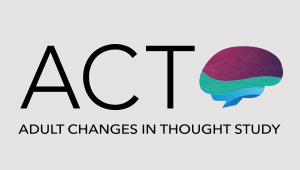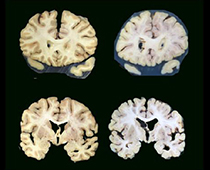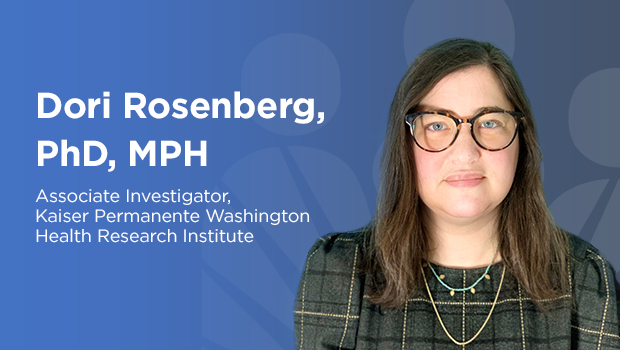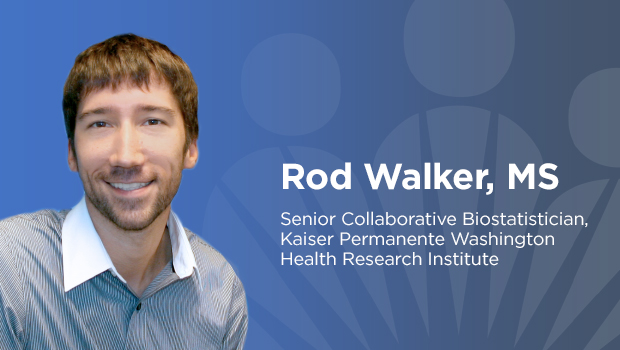Aging & Geriatrics
By 2050, the number of people age 60 and older is expected to double worldwide. Scientists at Kaiser Permanente Washington Health Research Institute (KPWHRI) are at the forefront of research to help older adults lead healthier lives.
Over 4 decades, our pioneering studies have helped answer important questions about aging, such as whether having surgery for cataracts can reduce the risk of dementia, what approaches can help older adults become more physically active, and whether widely used medications increase the risk of falls and fractures.
KPWHRI’s studies and collaborations encompass many key areas of aging research, including brain health, cardiovascular health, physical activity and behavior change, medication safety, and chronic disease management.
Research highlights
 Dementia research spanning decades
Dementia research spanning decades
For more than 30 years, the Adult Changes in Thought (ACT) Study has examined risk factors for dementia, with the goal of finding new ways to delay or prevent Alzheimer’s disease and cognitive decline. Among its findings, ACT has linked commonly used medications (anticholinergics) to a raised dementia risk. ACT also provided early, compelling evidence that exercising regularly can delay or prevent the onset of dementia in older adults. More recent research has explored other factors that may influence the risk of Alzheimer's, including air pollution and traumatic brain injury. To learn more about ACT and its impact, visit the ACT Study website.
 Advancements through collaborations
Advancements through collaborations
KPWHRI researchers have partnered with scientists across the country to advance our understanding of age-related health conditions. One example is KPWHRI’s collaboration with the Allen Institute for Brain Science. Using data and donated brains from participants of the ACT Study, researchers have developed the most detailed picture yet of how Alzheimer’s disease progresses at the cellular level.
 Caring for chronic illnesses
Caring for chronic illnesses
People with heart disease, diabetes, and other chronic illnesses are living longer than ever before. The Chronic Care Model — developed at KPWHRI’s Center for Accelerating Care Transformation (ACT Center) — is widely recognized as the leading model to guide health systems to improve care for chronic conditions. It has been translated into more than 30 languages and used for more than 25 years by health care organizations worldwide.
 Standing up for better health
Standing up for better health
A KPWHRI-led study found that reducing sitting time by about 30 minutes a day led to better blood pressure for older adults. Notably, these improvements were comparable to those found in studies where participants exercised more. In another KPWHRI study, researchers found that taking more frequent breaks from sitting may reduce the risk of serious blood clots in older women.
 Diagnosing dementia earlier
Diagnosing dementia earlier
KPWHRI is leading work to promote earlier recognition and diagnosis of dementia through the eRADAR risk score, which uses routine data from electronic health records to identify people at higher risk of having undiagnosed dementia.
Researchers in Aging & Geriatrics
 Melissa L. Anderson, MSPrincipal Collaborative Biostatistician |
 Ben Balderson, PhDSenior Collaborative Scientist |
 Erin J. Bowles, MPHDirector, Collaborative Science |
 Jessica Chubak, PhDSenior Investigator |
 Sascha Dublin, MD, PhDSenior Investigator |
 Nicole M. Gatto, PhD, MPHPrincipal Collaborative Scientist |
 Mikael Anne Greenwood-Hickman, MPHSenior Collaborative Scientist |
 Laura Harrington, PhD, MPHAssociate Investigator |
 Susan Hickman, PhDDirector, Investigative Science; Senior Investigator |
 Chloe Krakauer, PhDCollaborative Biostatistician |
 Linda K. McEvoy, PhDSenior Investigator |
 Jennifer C. Nelson, PhDDirector, Biostatistics; Senior Investigator |
 Robert Penfold, PhDSenior Investigator |
 Dori E. Rosenberg, PhD, MPHSenior Investigator |
 Lily N. Shapiro, PhDCollaborative Scientist |
 Pamela A. Shaw, PhD, MSSenior Biostatistics Investigator |
 Yu-Ru Su, PhDAssociate Biostatistics Investigator |
 Rod L. Walker, MSPrincipal Collaborative Biostatistician |
 Karen Wernli, PhDSenior Investigator |
 Brian D. Williamson, PhDAssociate Biostatistics Investigator |
 Onchee Yu, MSPrincipal Collaborative Biostatistician |
AFFLIATE RESEARCHERS
James Bowen, MD
Neurologist
Swedish Medical Center
Paul Crane, MD, MPH
Professor, Internal Medicine
University of Washington
David R. Crosslin, PhD
Assistant Professor, Biomedical Informatics and Medical Education
Adjunct Faculty, Genome Sciences, Division of Medical Genetics
University of Washington
Kristen Dams-O'Connor, PhD
Associate Professor, Department of Rehabilitation Medicine
Icahn School of Medicine at Mt. Sinai
James Floyd, MD, MS
Professor, Department of Medicine
University of Washington
Shelly Gray, PharmD, MS, AGSF
Professor, Department of Pharmacy
University of Washington
Gail Jarvik, MD, PhD
Professor, Medical Genetics, Genome Sciences, Department of Medicine
University of Washington
Dirk Keene, MD, PhD
Department of Pathology
Harborview Medical Center
Zachary A. Marcum, PhD, PharmD
Assistant Professor, School of Pharmacy
University of Washington
Wayne McCormick, MD, MPH
Head of Gerontology and Geriatric Medicine
UW Medicine
Sue McCurry, PhD
Research Professor, Psychosocial and Community Health
University of Washington
Elizabeth Phelan, MD, MS
Associate Professor, Medicine/Gerontology and Geriatric Medicine
Harborview Medical Center
Adjunct Associate Professor, Health Services
University of Washington
Janelle S. Taylor, PhD
Professor, Department of Anthropology
University of Toronto
Linda Teri, PhD
Professor, Psychosocial & Community Health
Director, Northwest Research Group on Aging, Psychosocial and Community Health
University of Washington
Oleg Zaslavsky, PhD, MHA, RN
Assistant Professor Biobehavioral Nursing and Health Systems Department
Associate Director of Research, de Tornyay Center for Health Aging
School of Nursing, University of Washington





